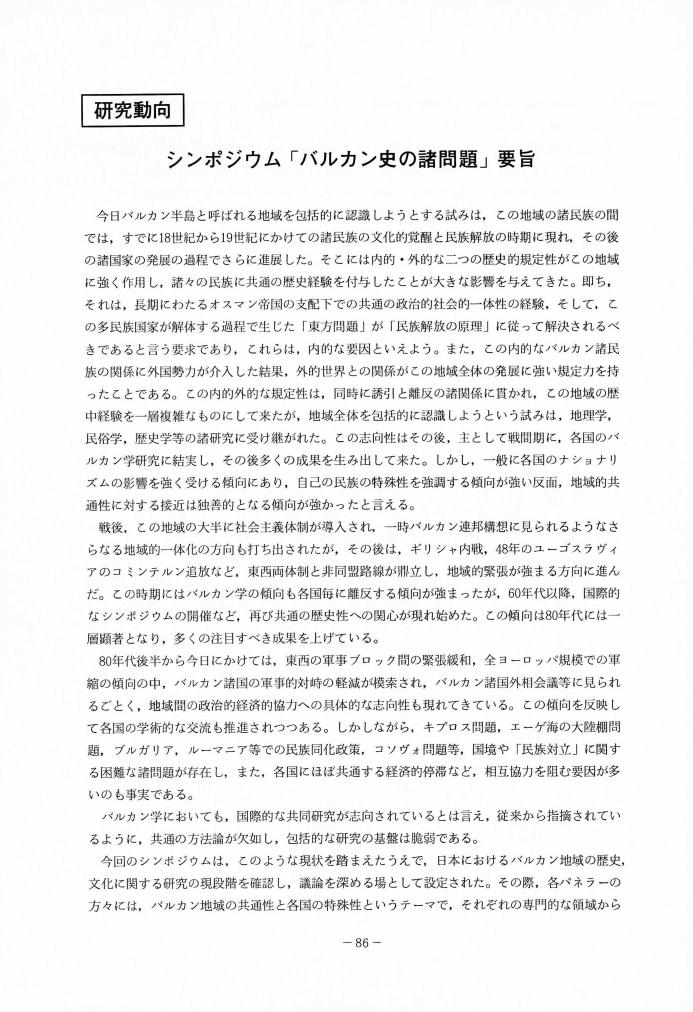- 著者
- 萩原 直樹
- 出版者
- 日本物理教育学会
- 雑誌
- 物理教育 (ISSN:03856992)
- 巻号頁・発行日
- vol.64, no.1, pp.62-63, 2016-03-08 (Released:2017-02-05)
- 被引用文献数
- 1
2 0 0 0 IR 『オーベルマン』と芥川龍之介「軍艦金剛航海記」をめぐって
- 著者
- 萩原 直幸
- 出版者
- 日本フランス語フランス文学会 中国・四国支部
- 雑誌
- フランス文学 (ISSN:09125078)
- 巻号頁・発行日
- no.33, pp.17-26, 2021-06-01
本稿は2019年12月5日、香川大学を主催校とし、新型コロナウィルス感染予防のためのオンラインで開催された日本フランス語フランス文学会中国・四国支部大会にて行った口頭発表をもとに、大幅に加筆・修正をしたものである。」
1 0 0 0 OA シンポジウム「バルカン史の諸問題」要旨
1 0 0 0 文脈構造の記憶の書き込みと情報表現
- 著者
- 萩原 直洋 塚田 稔 合原 一幸
- 出版者
- 一般社団法人電子情報通信学会
- 雑誌
- 電子情報通信学会技術研究報告. NC, ニューロコンピューティング
- 巻号頁・発行日
- vol.96, no.584, pp.183-188, 1997-03-18
実際の生理実験結果によれば、海馬神経回路の可塑性は時空間パターンに依存しニューロン間結合荷重が変化する事が知られている。海馬は外界の時間的・空間的情報を一つの文脈として一時的に保持する短期記憶の場所と言われている。ニューロン間の結合の重み(荷重)を変える事(学習則)によって、その情報は神経回路の荷重空間に一時的に貯えられる。本研究では、海馬の短期記憶のモデルとして単純な一層全結合のニューラルネットを用いた。入力は順序の組合わせの異なる時空間系列パターンとし、学習則に関しては、海馬CA1回路の長期増強(LTP)のデータに基づき、事象の生起の一致性と時間的履歴現象を考慮して提案された塚田らの時空間学習則とHebb則およびHebb則の時間への拡張則とする。これらの学習則による出力パターン分離機能をハミング距離を比較する事によって評価した。この結果、塚田らの時空間学習則は最も優れている事が明らかとなった。
- 著者
- 本橋 裕之 萩原 直人
- 出版者
- 一般社団法人 溶接学会
- 雑誌
- 溶接学会全国大会講演概要
- 巻号頁・発行日
- vol.2005, pp.184, 2005
マッチング度合いの異なる3種類の周溶接継手に対して、溶接部中央に表面切欠きを有する広幅引張試験を行った。直流電位差法により検出された延性き裂の発生挙動は、強度ミスマッチの影響を強く受け、強度マッチングの度合いが小さいほど、延性き裂発生までの変形量が小さくなった。
1 0 0 0 OA 黒潮変動が沿岸域の水産資源に及ぼす影響の監視と予測システムの構築
1 0 0 0 OA テニスのサービス速度と筋力との関係は技術レベルによって変化する
- 著者
- 大森 肇 三橋 大輔 七五三木 聡 斉藤 武利 安田 貴彦 萩原 直樹 岡田 英孝 勝田 茂
- 出版者
- 一般社団法人 日本体育学会
- 雑誌
- 日本体育学会大会号 第46回(1995) (ISSN:24330183)
- 巻号頁・発行日
- pp.308, 1995-09-10 (Released:2017-08-25)
1 0 0 0 IR 異国の評家との対話--F.L.Lucasの「文体論」から
- 著者
- 萩原 直之
- 出版者
- 大阪府立大学
- 雑誌
- 大阪府立大学紀要 人文・社会科学 (ISSN:04734645)
- 巻号頁・発行日
- no.6, 1958-03
- 著者
- 都筑 和泰 森山 亮 石本 祐樹 時松 宏治 萩原 直人
- 出版者
- 一般社団法人日本エネルギー学会
- 雑誌
- 日本エネルギー学会誌 (ISSN:09168753)
- 巻号頁・発行日
- vol.91, no.2, pp.104-110, 2012-02-20
Mid- and long- term energy balances of Japan were investigated after the Great East Japan Earthquake on the 11th of March, considering fossil fuel imports, environmental constraints, and economy as well as risks revealed by Fukushima nuclear accidents and disasters. It is concluded that i) great uncertainties on technology and economy are apprehensive about renewable energy oriented energy balance, ii) nuclear power is still an indispensable technological option, and iii) fossil fuels are necessary to meet the balance without both renewables as well as nuclear. The "energy best mix" strategy, which had long been the core philosophy in the Japanese energy policy, should not be amended with the severe nuclear accidents after the Earthquake.
1 0 0 0 OA 432 X80 鋼管の手動被覆アーク溶接による継手の機械的特性に関する検討
- 著者
- 本橋 裕之 萩原 直人
- 出版者
- 社団法人溶接学会
- 雑誌
- 溶接学会全国大会講演概要
- 巻号頁・発行日
- no.73, pp.362-363, 2003-09-08



